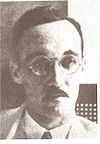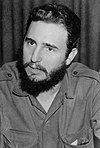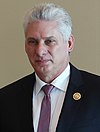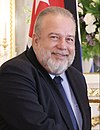
Guantanamo Bay Naval Base, officially known as Naval Station Guantanamo Bay or NSGB, is a United States military base located on 45 square miles (117 km2) of land and water on the shore of Guantánamo Bay at the southeastern end of Cuba. It has been leased to the United States with no end date since 1903 as a coaling station and naval base, making it the oldest overseas U.S. naval base. The lease was $2,000 in gold per year until 1934, when the payment was set to match the value of gold in dollars; in 1974, the yearly lease was set to $4,085.

Cuba has had a socialist political system since 1961 based on the "one state – one party" principle. Cuba is constitutionally defined as a single party Marxist–Leninist socialist republic with semi-presidential powers. The present Constitution of Cuba, which was passed in a 2019 referendum, also describes the role of the Communist Party of Cuba to be the "leading force of society and of the state" and as having the capability of setting national policy, and First Secretary of the Communist Party is the most powerful position in Cuba. The 2019 Constitution of Cuba identifies the ideals represented by Cuban independence hero José Martí and revolutionary leader Fidel Castro as the primary foundation of Cuba's political system, while also stressing the importance of the influence of the ideas of Marx, Engels, and Lenin.

Guantánamo is a municipality and city in southeast Cuba and capital of Guantánamo Province.
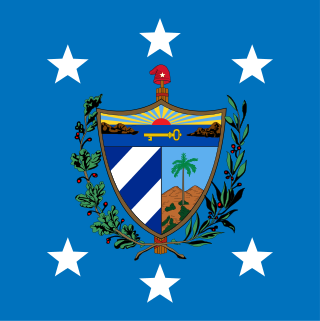
The president of Cuba, officially the president of the Republic of Cuba, is the head of state of Cuba. The office in its current form was established under the Constitution of 2019. The President is the second-highest office in Cuba and the highest state office. Miguel Díaz-Canel became President of the Council of State on 19 April 2018, taking over from Raúl Castro, and has been President of Cuba since 10 October 2019.

Noteworthy events of Guantánamo Bay.

Even before attaining its independence from Spain, Cuba had several constitutions either proposed or adopted by insurgents as governing documents for territory they controlled during their war against Spain. Cuba has had several constitutions since winning its independence. The first constitution since the Cuban Revolution was drafted in 1976 and has since been amended. In 2018, Cuba became engaged in a major revision of its constitution. The current constitution was then enacted in 2019.

The Council of State of Cuba is a 31-member body of the government of Cuba, elected by the National Assembly of People's Power. It has the authority to exercise most legislative power between sessions of the National Assembly of People's Power, subject to its approval, and to call the National Assembly of People's Power into session between its scheduled twice yearly sessions.

The Council of Ministers, also referred to as simply the Cabinet of Cuba, is the highest ranking executive and administrative body of the Republic of Cuba, and constitutes the nation's government. It consists of the President, the First Vice President and the five Vice Presidents of the Council of State, the Secretary of the Executive Committee, the heads of the national ministries, and other members as established by law.
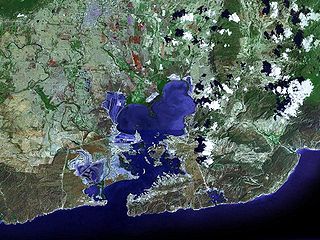
Guantánamo Bay is a bay in Guantánamo Province at the southeastern end of Cuba. It is the largest harbor on the south side of the island and it is surrounded by steep hills which create an enclave that is cut off from its immediate hinterland.
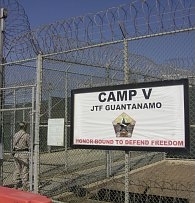
The Guantanamo Bay detention camp is a United States military prison within the Guantanamo Bay Naval Base, also referred to as Gitmo, on the coast of Guantánamo Bay in Cuba. As of April 2023, of the 779 people detained there since January 2002 when the military prison first opened after the September 11 attacks, 740 had been transferred elsewhere, 30 remained there, and nine had died while in custody.

The 1903 Cuban–American Treaty of Relations was a treaty between the Republic of Cuba and the United States signed on May 22, 1903. The treaty contemplated leases of Guantánamo Bay; one such lease had been executed earlier in the year in February 1903, and a second lease was executed later in the year in July 1903.
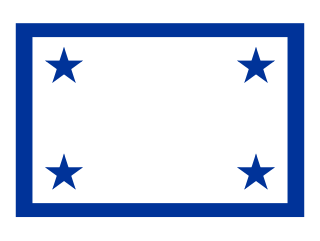
The prime minister of Cuba, officially known as the president of the Council of Ministers between 1976 and 2019, is the head of government of Cuba and the chairman of the Council of Ministers (cabinet). The prime minister is the third-highest office in Cuba, after the First Secretary of the Communist Party of Cuba and the President of Cuba, and the second-highest state office.
The Cuban Revolution was the overthrow of Fulgencio Batista's regime by the 26th of July Movement and the establishment of a new Cuban government led by Fidel Castro in 1959.

The 1940 Constitution of Cuba was implemented during the presidency of Fulgencio Batista on 10 October 1940. It was primarily influenced by the collectivist ideas that inspired the Cuban Revolution of 1933. Widely considered one of the most progressive constitutions at the time, it provided for land reform, public education, a minimum wage and other social programs. It had 286 articles in 19 sections.

A constitutional referendum was held in Cuba on 24 February 2019. Voters were asked whether they approved of a new constitution passed by the National Assembly of People's Power in July 2018. The reforms were approved, with 90.61% of valid votes cast in favour. The new constitution came into force on 10 April 2019 after it was proclaimed in the Cuban National Assembly and published in the Official Gazette of the Republic.
Events in the year 2019 in Cuba.
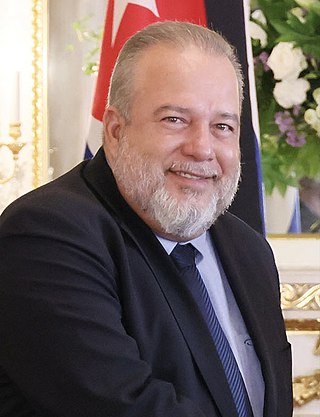
Manuel Marrero Cruz is a Cuban politician currently serving as the Prime Minister of Cuba, and the first since re-establishment of the office of Prime Minister in December 2019 after the 43-year abolition of the position dating from 1976. The last Prime Minister before the abolition of the office was Fidel Castro. Marrero is the first person to hold the position of Prime Minister of Cuba in 43 years. A member of the Communist Party of Cuba, he served as the country's long-time Minister of Tourism from 2004 until his appointment to the office of Prime Minister in December 2019. During his tenure as tourism minister, Cuban tourism witnessed massive resilience. Marrero is an architect and worked in Gaviota, the tourism arm of the Cuban military, where he also held the rank of colonel.

Elba Rosa Pérez Montoya is a Cuban politician and academic. She served as Cuba's Minister of Science, Technology and the Environment for 11 years until being replaced by Eduardo Martínez in February 2024.
Juan Carlos García Granda is a Cuban politician currently serving as the Minister of Tourism of Cuba. He served as first deputy minister under former Minister of Tourism Manuel Marrero Cruz until Cruz's appointment to the office of Prime Minister in December 2019.

